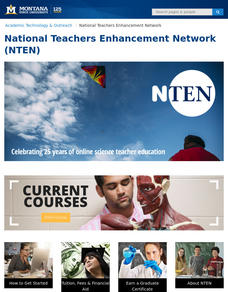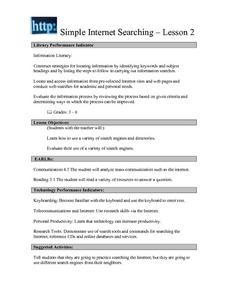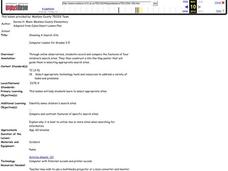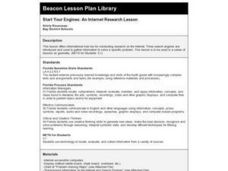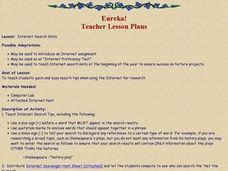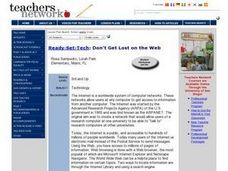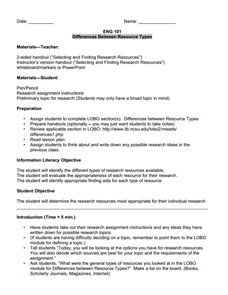TryEngineering
Search Engines
Introduce search engines with an activity that models how search engines work and the different algorithms they employ. Working in groups, class members then build search queries to demonstrate the knowledge learned.
Curated OER
Discovering Differences Between Internet Search Engines
Students explore the differences in search engines available on the Internet. Most users are unaware of the differences between search engines. Some sample larger or smaller portions of the World Wide Web than others.
Curated OER
Butterflies, Butterflies, Butterflies
Transform your class into a butterfly museum! Research different types of butterflies, their habitat, and life cycle. Interactive components such as PowerPoint presentations, Claymation movies, and webpages add pizzaz to the museum...
Curated OER
Simple Internet Searching Lesson 2
Learn how to use search engines and keywords! Learners evaluate the information process using given criteria and determine ways in which the process may be improved.
Curated OER
Rev the Engine
Young scholars view a PowerPoint presentation about how to successfully use search engines while conducting research. The presentation demonstrates how to conduct a search for information on the Internet. Once PowerPoint is complete,...
Curated OER
Choosing A Search Site
Computer savvy kids construct a lift-the-flap poster to aid them in selecting appropriate search sites for research and information gathering. Through online observations, they record and compare the features of four children's search...
Education World
Use Boolean Search Terms to Shorten Web Searches
Have you ever conducted a Web search and received too many hits? Teach your class about Boolean search terms and provide them time to practice conducting efficient online searches. This lesson plan contains several fun activities which...
TryEngineering
Search Engines
Learn how to find things quickly and efficiently on the Internet. The lesson teaches how search engines work and how to efficiently use them. It includes an activity where groups develop search queries to find sites using given criteria.
Curated OER
Dig In
Students identify where vegetables originate from. In this agriculture lesson, students use a search engine to find out where certain vegetables originate from. Students plot the information onto a world map.
Teaching Tolerance
Understanding Online Searches
Discover what's behind an online search. Scholars read a handout and engage in discussions to learn how to critically evaluate online search results. Then, working in small groups, they create posters listing their demands for search...
Curated OER
Start Your Engines: An Internet Research Lesson
Fifth graders engage in a lesson which offers informational how-tos for conducting research on the Internet. Three search engines are introduced and used to gather information to solve a specific problem.
Curated OER
Internet Search Skills
High schoolers receive an Internet Scavenger Hunt Sheet, then compete to see who can search the Internet the fastest. They review Internet search tips.
Curated OER
Searching the Internet for Information
In this searching the Internet worksheet, young scholars solve and complete 20 various short answer questions related to the Internet. First, they find information on the Internet and communicate that information to others via email....
Curated OER
An Introduction to Search Engine
Pupils practice researching on the Internet using various search engines.
Curated OER
Finding Your Way in the World Wide Web
Researchers practice grouping items to explore the concept of a database. They apply these concepts to the WWW search engine format and consider why it is important to enter the most specific information.
Curated OER
Locating And Utilizing Information Using The Internet
Third graders practice typing in a web address to find a specific web page and how to use a search engine to locate specific information. They access a search engine to locate information about geology to answer the questions on a quiz.
Curated OER
Don't Get Lost on the Web
Scholars discuss purpose of search engines, define World Wide Web, become familiar with website addresses, demonstrate understanding of site updating, create a list of topics about which they would like more information, and visit at...
Curated OER
Historical Locations of The Civil Rights Movement
A geographic perspective helps historians learn about significant eras such as the civil rights movement. Through research and source analysis, learners create a report depicting a significant location of this time. They synthesize their...
Curated OER
Internet Challenge Worksheet
For this Internet usage worksheet, learners navigate to a specific search engine website and enter the word "Oregon Trail". Students then answer 7 questions based on their results.
Curated OER
Differences Between Resource Types
Google it! Like Kleenix, Google has genericized. But when beginning a project, young researchers need to go beyond search engines and become aware of the different types of research resources available. Introduce the options with a...
Curated OER
Where in the World is the Wide Web?
Sixth graders investigate how the web works and how to search effectively. In this Internet use lesson plan, 6th graders brainstorm positive and negative experiences they have had while on the Internet. Students view two web sites to...
Curated OER
Internet Challenge Worksheet
In this Internet usage worksheet, students navigate to a specific website online, all of which are search engines. Students are then instructed to search on a specific word and answer questions based on the results they get. There are 7...
Curated OER
Internet Challenge Worksheet
In this Internet usage worksheet, students navigate to specific websites, all of which are search engines. Students are instructed to search on the word "Oregon" and answer 7 questions about their results.
Curated OER
Survival of Native American Culture
Students research the five tribes of the Iroquois Nation focusing on housing, food, clothing, transportation, religion, and language. They research using Internet sources and book mark sites for reuse.



